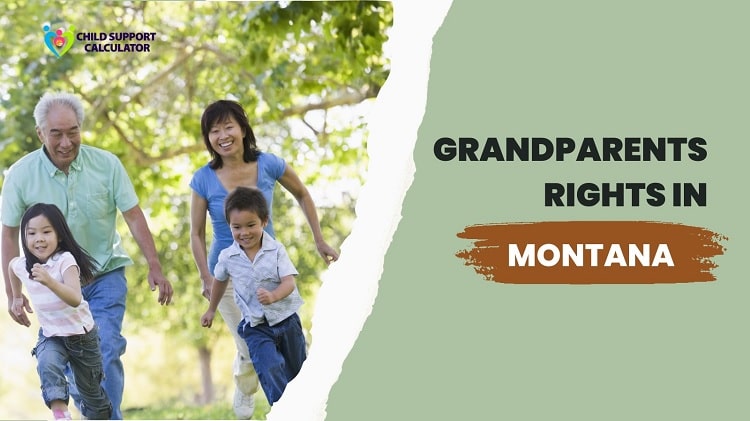Grandparents Rights In New Jersey (Updated) 2024
The relationship between a grandparent and a child is one of a kind and appreciated. Unfortunately, NJ law restricts grandparents’ legal visitation rights with their grandkids. When a parent dies, when a grandparent dies, or when a breach between grandparents and parents begins, a grandparents’ legal rights action is common.

If grandparents can show that they are psychological parents to their grandchildren, the court will consider what is best for the kid in terms of custody. Even if the parent wins custody, grandparents who are psychological parents will be permitted visitation with the child as a matter of course. This article explains Grandparents rights in New Jersey.
Visitation Rights In New Jersey
A grandparent or sibling of a child living in New Jersey can apply for visitation under the Grandparents’ Visitation Statute. The applicant must show that the visitation is in the best interests of the kid. This law applies to families who are still together as well as those who have been separated due to death, divorce, or separation. When deciding on visitation, the court will take into account eight factors:
- Relationships between the applicant and each of the child’s parents or the person with whom the child is residing.
- The length of time since the child last communicated with the app.
- The effect of such visits on a child’s connection with his or her parents or the person with whom he or she is living.
- If the parents are divorced or separated, the time-sharing arrangement between them affects the child.
- The applicant’s willingness to file the application in good faith.
- History of physical, emotional, or sexual abuse or neglect by the applicant.
- Any other aspect that is important to the child’s best interests.
Grandparents Custody Rights In New Jersey
To begin with grandparents rights in New Jersey you must prove that the child might be injured if your visitation request is granted. This is known as the “burden of proof.” Judges will look at any relevant evidence to see if the kid would be injured if the court-ordered time is not followed, including but not limited to:
- The death of one of their parents.
- Changes in the child’s household during or after the parents’ divorce or separation significantly impact the child’s life.
- A long-standing relationship between grandparents and grandchildren.
- The youngster would suffer specific psychological impairment, according to expert testimony.
Then, using any applicable evidence, you must show that spending time with you is in your grandchild’s best interests, including but not limited to:
- Your child’s relationship with you.
- Your relationship with the parents of the child.
- The amount of time it’s been since you’ve seen the child.
- If the proposed time is allowed, what effect will it have on the child’s connection with his or her parent(s)?
- The visitation schedule of the parents (if they are divorced).
- Your justifications for requesting a visit.
- Any history of sexual or physical abuse by you or the child’s parent(s), as well as any other issue, is affecting the child’s best interests.
- If you have previously cared for the kid full-time, the court will consider your proposed visits to be in the child’s best interests.
Do grandparents have rights in NJ?
The legal authority to make decisions concerning their children’s care and well-being rests with their parents. After a divorce or if the parents were never married, custody and visitation of minor children frequently become a topic of disagreement between parents. Co-parenting issues, unfortunately, may prevent a child from seeing their grandparents.
If you are denied visitation with your grandchild, you can go to court to get legal visitation rights. In some cases, the state of New Jersey provides grandparents with visitation and even child custody rights.
Faqs
“The child has a right to spend time with and communicate with people who are vital to their care, welfare, and development – including grandparents – on a regular basis unless doing so is in the child’s best interests.”
The biological parents and relatives of a kid who is adopted by anybody other than a stepparent renounce all legal rights to the adoptive parents and family. However, after a child’s adoption, the court may consider providing biological grandmother visits if the court feels the sought term is in the child’s best interests, taking into account the child’s health, safety, and general welfare.
Anyone can file a custody petition with the court if they can show that the kid’s natural or legal parents are unfit to provide a secure and supportive living environment for the youngster. You must prove that having the child reside with you is in the child’s best interests, taking into account the child’s health, safety, and overall well-being.
If a grandmother refuses to return your child after a visit, you may want to limit their access for their own safety. When a parent refuses grandparent visits, the law assumes that they are acting in the best interests of their child.
Is it possible for a parent to give a grandparent temporary custody of their child? When parents are unable to care for their children due to unanticipated circumstances, grandparents can gain temporary custody of their grandkids. Typically, grandchildren will begin living with their grandparents in this situation.
If a youngster is over the age of 12, he or she has the right to choose who will look after him or her. If one of the child’s parents is deceased or if a parent’s parental rights have been terminated, grandparent visitation rights may be granted.
More than 10% of children under the age of two live with their grandparents, while 3% of youngsters aged 15 to 17 live with their grandparents. Three-generation homes are far more common among younger children than among older children.
In order to persuade the court that the kid should be put with them, grandparents must generally show that the parent is unfit. Even if the grandparent-grandchild relationship is strong, it is often difficult for a grandparent to get custody of a grandchild against the wishes of the parents.







